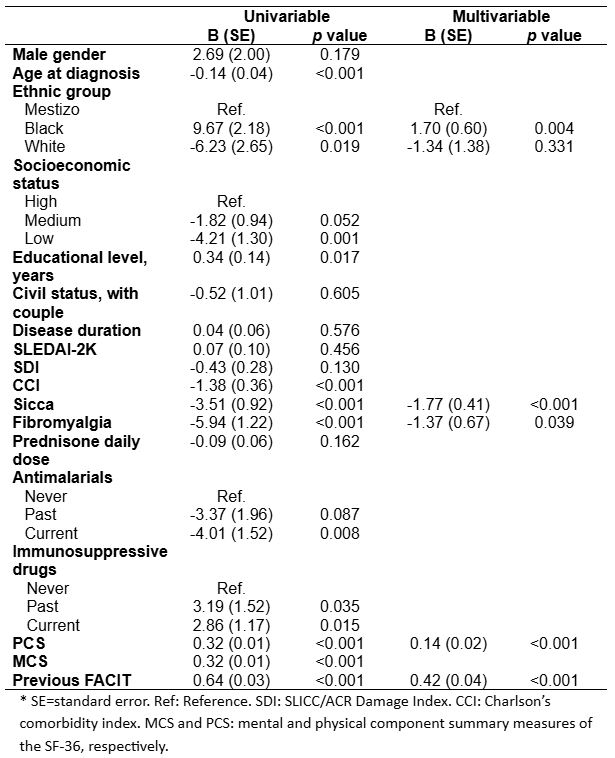Session Information
Date: Tuesday, October 28, 2025
Title: (2377–2436) Systemic Lupus Erythematosus – Diagnosis, Manifestations, & Outcomes Poster III
Session Type: Poster Session C
Session Time: 10:30AM-12:30PM
Background/Purpose: Systemic Lupus Erythematosus (SLE) is a chronic autoimmune disease characterized by a wide spectrum of clinical manifestations, fatigue being one of them; it is quite frequent and it is found in up to 90% patients. Thus, understanding its determinants is important; this has not been well studied in Latin-American patients. The aim of this study is to determine the factors associated with fatigue in SLE patients from a Latin American cohort.
Methods: Patients from a single-center prevalent Peruvian SLE cohort [the Almenara Lupus cohort] were included. Fatigue was assessed with the FACIT-Fatigue Scale, which has been validated in SLE and is frequently used. This 13-item questionnaire is based on the patients’ experience over the previous 7 days; higher scores indicate less fatigue. Potentially associated factors were sex, age at diagnosis, ethnicity, educational level, relationship status (single or couple), socioeconomic status (SES), disease duration, disease activity (ascertained with the SLEDAI-2K), damage accrual (ascertained with the SLICC/ACR damage index), comorbidities (ascertained with the Charlson’s comorbidity index), sicca symptoms, fibromyalgia, glucocorticoid dose, antimalarial and immunosuppressive drugs use, as well as the mental and physical component summary measurements of the SF-36 (PCS and MCS).To determine the predictors of fatigue during the follow-up, generalized estimating equations (GEE) were used. Potential predictors were sex, age at diagnosis, ethnicity, educational level, relationship status, SES, disease duration, disease activity, damage, comorbidities, sicca symptoms, fibromyalgia, glucocorticoid dose, antimalarial and immunosuppressive drugs use, PCS and MCS. The multivariable models were done using a backward selection procedure with an alpha to stay in the model of 0.05.
Results: Four-hundred and one patients with 2228 visits were included and evaluated; 31 (7.7%) of the patients were male, 393 (98.0%) were Mestizo and their mean age at diagnosis was 35.1 (13.3) years. The mean FACIT score was 33.0 (10.8). In the multivariable analysis, the Afro-Latin American ethnicity, the PCS and the previous FACIT were associated with lower levels of fatigue, whereas having sicca symptoms and fibromyalgia were associated with higher levels of fatigue (Table 1).
Conclusion: In our SLE patients, the Afro-Latin American ethnic group, a higher PCS and the previous FACIT were associated with less fatigue; sicca symptoms and fibromyalgia were associated with more. Further studies are needed to evaluate these findings in other populations and seek better strategies to improve fatigue in SLE patients.
 Table 1: Factors associated with fatigue as assessed by the FACIT questionnaire.
Table 1: Factors associated with fatigue as assessed by the FACIT questionnaire.
To cite this abstract in AMA style:
Oyarce-Calderón A, Gamboa-Cárdenas R, Pimentel-Quiroz V, Garcia-Hirsh S, Rodríguez-Bellido Z, Pastor-Asurza C, Perich-Campos R, Alarcón G, Ugarte-Gil M. Factors Associated With Fatigue In Systemic Lupus Erythematosus: Data From The Almenara Lupus Cohort [abstract]. Arthritis Rheumatol. 2025; 77 (suppl 9). https://acrabstracts.org/abstract/factors-associated-with-fatigue-in-systemic-lupus-erythematosus-data-from-the-almenara-lupus-cohort/. Accessed .« Back to ACR Convergence 2025
ACR Meeting Abstracts - https://acrabstracts.org/abstract/factors-associated-with-fatigue-in-systemic-lupus-erythematosus-data-from-the-almenara-lupus-cohort/
